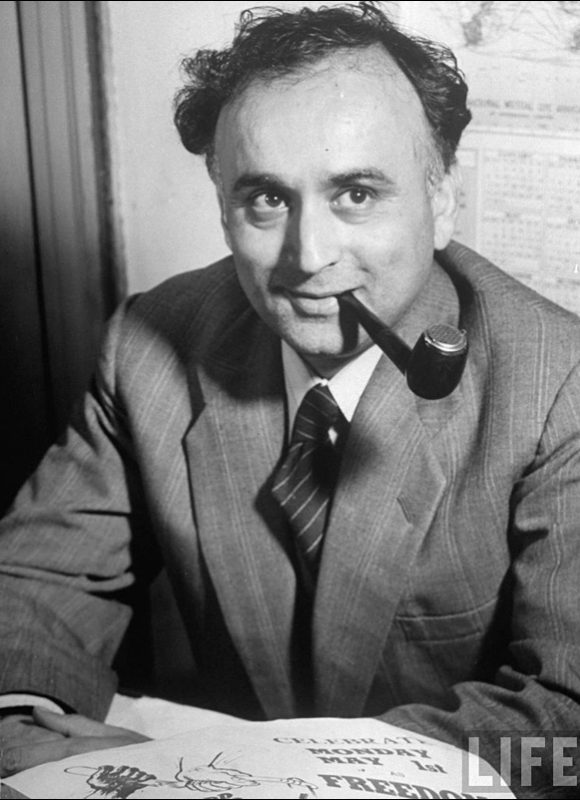PIONEER
Yusuf Dadoo

Member of the Communist Party of South Africa | Leader of the South African Indian Congress | Human Rights Activist
Born: 5 September 1909 Died: 19 September 1983
“We are law-abiding citizens and are prepared to obey all laws made for the peace, order, and the good government of the country. But laws in the making of which we have no say and which are bad and unjust and calculated to disturb the peace and harmony can not only not be tacitly approved of, but must be fought by every legitimate means at the disposal of the people.”
Who is
Yusuf Dadoo?
A medical doctor, Communist Party leader, and anti-apartheid activist.
Professions
and Roles
Medical doctor, activist, and politician.
Best Known For
His work as both a communist and a representative for various Indian civil rights groups, as well as his efforts to join forces with other liberation movements like the African National Congress (ANC).
Life highlights
- Dadoo studied medicine in London in 1929. He joined the British Labour Party, became interested in Marxist literature, participated in protest action, and was arrested as a result.
- He continued his studies in Edinburgh after being moved by his father in an unsuccessful attempt to curb his political involvement.
- Dadoo returned to South Africa, opened a surgery in Johannesburg, and joined the Transvaal Indian Congress amongst a variety of other civil rights organisations, committees, and groups.
- He joined the Communist Party of South Africa (CPSA) in 1939, and was elected to its central committee in 1941, where he served for 42 years.
- Dadoo was charged twice for expressing anti-war sentiments, and jailed. He was one of the key activists in 1946 who began the Passive Resistance Campaign against the Asiatic Land Tenure and Indian Representations Bill, known as the Ghetto Act. He was sentenced and jailed again for his involvement.
- Dadoo signed the Joint Declaration of Cooperation known as the ‘Three Doctors’ Pact’ in 1947, alongside Dr A B Xuma of the ANC and Dr Monty Naicker of the Natal Indian Congress. This was an official recognition of the importance of cooperation between African and Indian liberation organisations.
- He was jailed yet again in 1948 for entering the Transvaal from Natal and contravening immigration laws.
- In 1950, he was elected President of the SAIC, which joined the ANC in its 1952 Defiance Campaign.
- He was one of the CPSA members to secretly reform the organisation as the South African Communist Party in 1953, after its banning in 1950.
- Dadoo was banned by the apartheid government, which prevented open involvement in meetings. He was sent, against his own wishes but at the behest of the CPSA, into exile overseas in 1960. He continued his work internationally but never returned to South Africa.
IN THE WORDS OF OTHERS
“Dr Yusuf Mohamed Dadoo played an outstanding role in the South African liberation movement for over half a century – in persuading the Indian community to link its destiny with that of the African majority, in building the unity of all the oppressed people and democratic whites of that country in a common struggle against racism, in promoting fearless and militant resistance to the oppressors, and in developing the international outlook of the movement and international solidarity with it. He led the non-violent Indian passive resistance movement – uniting Gandhians, Marxists, and others. He was a founder and leader of the Non-European United Front, and of the Communist Party when it was revived as a clandestine organisation. And since going into exile in 1960, he played a key role in promoting underground and armed struggle in South Africa and a worldwide anti-apartheid movement.”
– Enuga Sreenivasulu Reddy, former head of the United Nations’ Centre Against Apartheid
“We are gathered here to pay homage to an outstanding leader of the African liberatory struggle, a comrade and friend who devoted most of his life in the service of his people, a communist of world prominence; a dedicated and convinced internationalist who has played an effective role in the anti-imperialist movement for world peace and security and for the social progress of mankind. Loved and admired throughout our movement, ‘Doc’ – as he was popularly known – combined the best qualities of a revolutionary patriot and dynamic leader of the working class. Because of his clear understanding of the factors underlying national oppression and economic exploitation of the black South African masses, he was able in his own unassuming manner, to guide and inspire others to commit themselves fully in the struggle for the noble ideals of freedom, democracy and a just social order. Most important of all, he led by example.”
– Oliver Tambo, then President of the ANC, 1983
“Comrade Yusuf was essentially a man of duty and not privilege; a revolutionary who gave and who expected nothing for himself in return. Indeed he was a musket-bearer who was always ready to be in front – for duty and not for position or honours. And when deserved honours were heaped upon him, they left him genuinely startled and almost embarrassed. He was a most modest person.”
– Joe Slovo, then General Secretary of the SACP, 1991
https://www.sahistory.org.za/people/dr-yusuf-mohamed-dadoo
Dadoo, Yusuf (1952), ‘Statement from the dock before being sentenced in the Johannesburg Magistrate’s Court for Defying Banning Orders, July 1952’, The Clarion, 24 July 1952, https://www.sacp.org.za/docs/history/dadoo-a.html#5i
Reddy, E S (1990), ‘South Africa’s freedom struggle’, 26 June 1990, https://www.sahistory.org.za/archive/south-africas-freedom-struggle-es-reddy
Slovo, J (1991), ‘A Tribute to Yusuf Dadoo’, African Communist, 3rd Quarter, https://www.sacp.org.za/docs/history/dadoojs.html
Vadi, I (19 September 2019), ‘A tribute to Dr Yusuf Dadoo’, Politicweb, https://www.politicsweb.co.za/documents/tribute-to-dr-yusuf-dadoo–ahmed-kathrada-foundat
